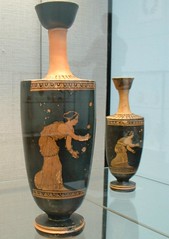I’m Jordan and I’m a writer who doesn’t have a muse. And I’m okay with that.
It seems like most writers, and other “creatives,” have a muse—an imaginary personification of their creative capacity. When “the muse strikes,” it’s time to write. When the muse kicks off for the day/week/year, we’re out of luck. It seems like the  only time I hear about a muse is when it’s not doing its job:
only time I hear about a muse is when it’s not doing its job:
- “My muse snaps her gum at me and rolls her eyes at my plot ideas.”
- “My muse goes after every shiny new idea that crosses my mind like a raccoon with gambling debts. Also, he’s in charge of my similes.”
- “My muse’s got nothin.”
Having a muse does alleviate some pressure to create (something I think I learned from Elizabeth Gilbert’s TED speech?). It can be draining and stressful to have to come up with everything yourself. If you’re stuck for an idea, dwelling on that fact can make you feel even less creative and more pressure to come up with something.
Maybe it’s pride, but I actually like coming up with ideas myself, or brainstorming with others. I like to think of myself as creative—and good enough and smart enough (and gosh darn it, people like me) to come up with solutions to my problems and ideas I can’t wait to write about. For the most part, I rarely disappoint myself—though it can be a little bit of a struggle when I’m burned out or just taking time off.
I think the biggest problem I have with muses is this idea that we’re abdicating the responsibility and the ability to create ourselves. Clearly not everyone with a muse does this, but some people use the muse less as a tool to encourage creative freedom and more as a slave driver.
As I said a few years ago in comments on a friend’s blog,
I think true genius is one that can still function as a normal human being while mastering his or her art. Those “geniuses” who ditch other people for their labs or their tablets because their fickle muse strikes them momentarily are at the mercy of capricious bouts of insight.
[The person she quoted] seems to be buying into the “genius is the ability to write pure, unmitigated, beautiful truths to power as they flow ceaselessly from my pen—while the muse lasts” school of thought.
For probably 99% of people, however, genius is the stroke of artistry that manifests itself while you’re trudging along—whether that trudging is through the other 70,000 words of your manuscript or through 70,000 diapers. “Genius” and talent, even taken together, rarely go anywhere without hard work, discipline and dedication.
What do you think? Do you have a muse? Is s/he a slacker, or does s/he work as hard as you?
Photo by Happy A

 This phrasing comes from
This phrasing comes from 

